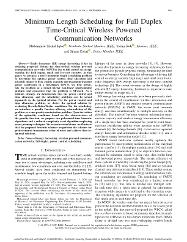| dc.contributor.author | Iqbal, Muhammad Shahid | |
| dc.contributor.author | Şadi, Yalçın | |
| dc.contributor.author | Coleri, Sinem | |
| dc.date.accessioned | 2020-09-27T11:16:28Z | |
| dc.date.available | 2020-09-27T11:16:28Z | |
| dc.date.issued | 2020 | |
| dc.identifier.issn | 1536-1276 | en_US |
| dc.identifier.issn | 1558-2248 | en_US |
| dc.identifier.uri | https://hdl.handle.net/20.500.12469/3447 | |
| dc.identifier.uri | https://doi.org/10.1109/TWC.2020.2999130 | |
| dc.description.abstract | Radio frequency (RF) energy harvesting is key in attaining perpetual lifetime for time-critical wireless powered communication networks (WPCNs) due to full control on energy transfer, far field region, small and low-cost circuitry. In this paper, we propose a novel minimum length scheduling problem to determine the optimal power control, time allocation and schedule subject to data, energy causality and maximum transmit power constraints in a full-duplex WPCN. We first formulate the problem as a mixed integer non-linear programming problem and conjecture that the problem is NP-hard. As a solution strategy, we demonstrate that the power control and time allocation, and the scheduling problems can be solved separately in the optimal solution. For the power control and time allocation problem, we derive the optimal solution by evaluating Karush-Kuhn-Tucker conditions. For the scheduling, we introduce a penalty function allowing reformulation of the problem as a sum penalty minimization problem. Upon derivation of the optimality conditions based on the characteristics of the penalty function, we propose two polynomial-time heuristic algorithms and a reduced-complexity exact algorithm employing smart pruning techniques. Via extensive simulations, we illustrate that the proposed heuristic schemes outperform the schemes for predetermined transmission order of users and achieve close-to-optimal solutions. | en_US |
| dc.language.iso | eng | en_US |
| dc.publisher | IEEE | en_US |
| dc.rights | info:eu-repo/semantics/openAccess | en_US |
| dc.subject | Wireless communication | en_US |
| dc.subject | Batteries | en_US |
| dc.subject | Optimal scheduling | en_US |
| dc.subject | Resource management | en_US |
| dc.subject | Wireless sensor networks | en_US |
| dc.subject | Energy harvesting | en_US |
| dc.subject | Power control | en_US |
| dc.subject | Energy harvesting | en_US |
| dc.subject | Wireless powered communication networks | en_US |
| dc.subject | Full duplex | en_US |
| dc.subject | Power control | en_US |
| dc.subject | Scheduling | en_US |
| dc.title | Minimum Length Scheduling for Full Duplex Time-Critical Wireless Powered Communication Networks | en_US |
| dc.type | article | en_US |
| dc.identifier.startpage | 5993 | en_US |
| dc.identifier.endpage | 6006 | en_US |
| dc.relation.journal | IEEE Transactions on Wireless Communications | en_US |
| dc.identifier.issue | 9 | en_US |
| dc.identifier.volume | 19 | en_US |
| dc.department | Fakülteler, Mühendislik ve Doğa Bilimleri Fakültesi, Elektrik-Elektronik Mühendisliği Bölümü | en_US |
| dc.identifier.wos | WOS:000568683900025 | en_US |
| dc.identifier.doi | https://doi.org/10.1109/TWC.2020.2999130 | en_US |
| dc.identifier.scopus | 2-s2.0-85091164204 | en_US |
| dc.institutionauthor | Şadi, Yalçın | en_US |
| dc.relation.publicationcategory | Makale - Uluslararası Hakemli Dergi - Kurum Öğretim Elemanı | en_US |
















